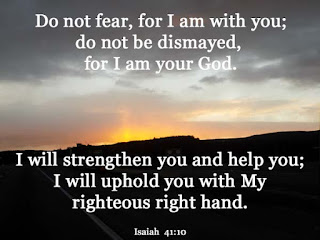“There isn’t one of us,” writes dear Frederick Buechner, “whose life hasn’t flamed up into moments when a door opened somewhere that let the future in, moments when we moved through that door. . . .” (A Room Called Remember)
That
day—the one I’ve been telling you about, day three in Lomalinda—has always
stood out in my memory. After more than forty years, recalling it still pains
me. But let me hasten to say the memory of that day also amazes me, it makes me
smile, it warms my heart.
Here’s
why: Even though I was shattered—broken, stunned, scared—on that afternoon, a
door opened—God Himself stood on the other side of the door, and He opened it—even
if I hadn’t fully grasped that yet.
Since
that day, I’ve long taken comfort in what the Bible tells us: God goes before His
children—He is the vanguard—in the lead, on the front line. (1 Chronicles 14:15,
Isaiah 52:12).
God
was already in Lomalinda when I arrived. He was there, welcoming me, opening a
door to my new life. I was a nervous wreck, but He was unflappable. I was
disoriented, but He was steady, focused.
God
also goes behind his children—he is the rear guard (Isaiah 52:12). He brings up
the rear, protecting us from what might attack from behind. Rearward also means
to gather up—God gathers us in His arms when we are weak. He comes along behind
and helps gather up the messes and broken pieces we left along the way.
So
our wonderful God goes before us to lead
and
He follows behind us to protect and help.
Front
and back, we’re wrapped in His loving arms.
If
I’d have listened to God, I might have heard Him welcoming me, smiling, and saying
something like He said to Habakkuk: “Look, watch—and be utterly amazed. For I
am going to do something that you wouldn’t believe even if someone told you
about it” (Habakkuk 1:5).
On that steamy afternoon in Lomalinda,
standing—in my sweat-drenched clothes—
in that little red brick house,
thanking God for strong breezes
blowing through the window slats,
and listening to parrots and crickets
and an occasional dog bark on a nearby
hill,
God opened a new
door for me
and welcomed
me into my new, good future.
And I stepped
through that open door.
It
was as if He was saying, “My thoughts are completely different from yours,”
says the Lord. “And my ways are far beyond anything you could imagine. For just
as the heavens are higher than the earth, so are My ways higher than your ways,
and my thoughts higher than your thoughts” (Isaiah 55:8-9).
And
if I had been thinking clearly, if I could have found words, I might have
answered Him something like this:
“Holy
God of love. . . You love me just as I am
and
in spite of what I have done.
Most
of all, I know that
You
are involved with me to enable me to be
the
person I was created and destined to be.
I
can trust You because
I
have found You utterly reliable
each
time I have trusted my needs
and
problems to You.”
(Lloyd
John Ogilvie, Quiet Moments with God)












